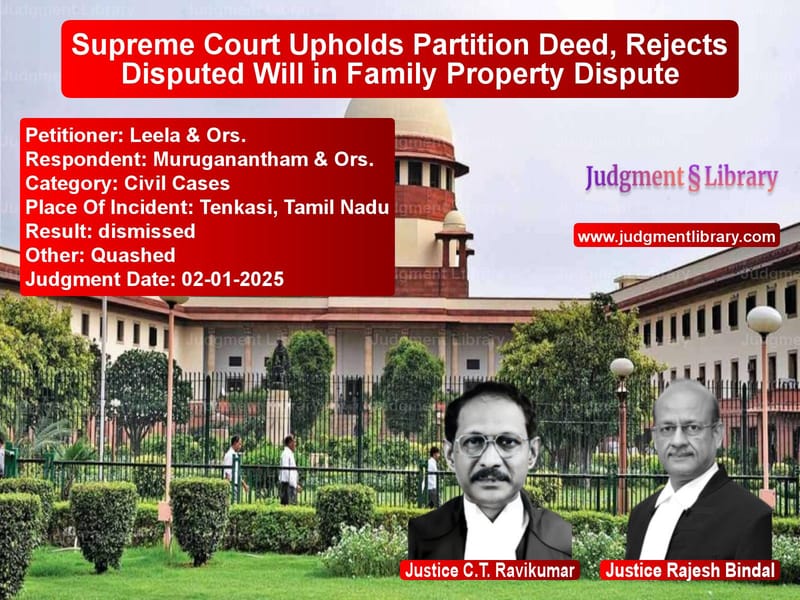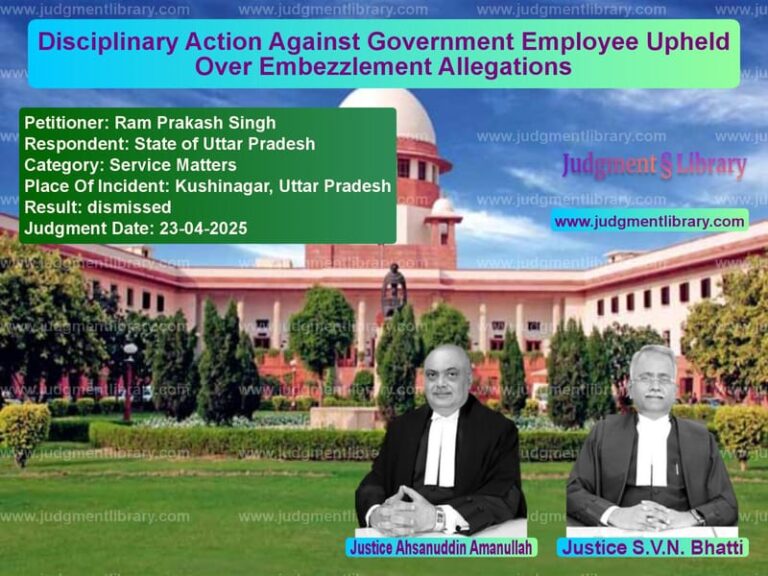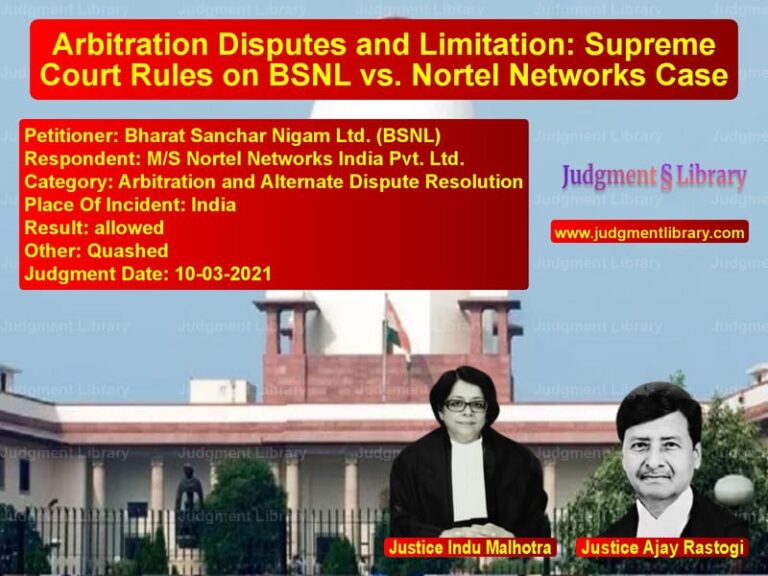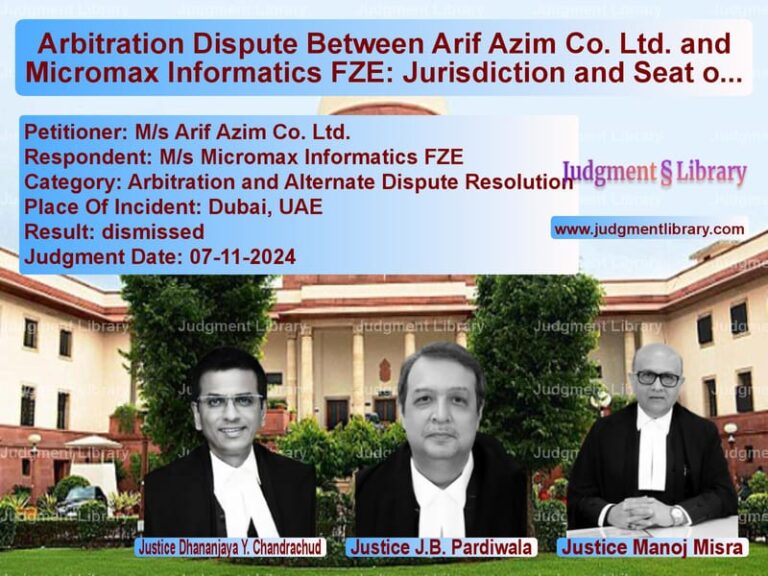Supreme Court Upholds Partition Deed, Rejects Disputed Will in Family Property Dispute
The Supreme Court of India, in a significant judgment, dismissed an appeal challenging the rejection of a disputed Will in a family partition dispute. The case of Leela & Ors. v. Muruganantham & Ors. involved a legal battle over property inheritance rights between the legitimate and illegitimate heirs of the deceased, Balasubramaniya Thanthiriyar. The Supreme Court upheld the findings of the trial court and the High Court, ruling that the disputed Will was surrounded by suspicious circumstances and could not be accepted as valid.
Background of the Case
The dispute arose over the inheritance of properties belonging to Balasubramaniya Thanthiriyar, who was survived by two wives and their respective children. The deceased had two wives:
- Rajammal (first wife): She had three sons and one daughter—Muruganantham, Ganesh Murthy, Kannan, and Mahalakshmi.
- Leela (second wife): She had two sons—Sivakumar and Mageshwaran.
The legal issue was whether Leela and her sons were entitled to inherit the properties under a Will allegedly executed in their favor by the deceased.
Key Events Leading to Litigation
- In 1989, Balasubramaniya executed a partition deed dividing his properties into four parts:
- The first schedule was retained by himself.
- The second schedule was allotted to his sons from the first wife.
- The third schedule was granted to his first wife, Rajammal.
- The fourth schedule was assigned to his daughter.
- He passed away in 1991.
- In 1992, the respondents (children from the first wife) filed a suit for partition of the first-schedule properties, claiming a 5/7th share.
- The appellants (second wife and her sons) produced a Will dated April 6, 1990, bequeathing the first-schedule properties exclusively to them.
- The respondents challenged the authenticity of the Will, arguing that it was forged and executed under suspicious circumstances.
Trial Court and High Court Findings
- The trial court ruled that the Will was invalid due to inconsistencies and suspicious circumstances.
- The High Court upheld this decision, stating that the evidence presented failed to establish the Will’s authenticity beyond reasonable doubt.
- Both courts ruled that the properties should be divided per the 1989 partition deed.
Arguments by the Appellants (Leela & Ors.)
- The appellants argued that the Will was validly executed and satisfied legal requirements.
- They contended that the trial court and High Court failed to give due weight to the testimony of attesting witnesses who confirmed the execution of the Will.
- They claimed that Balasubramaniya intended to provide for them separately and thus executed the Will.
- They argued that the respondents had no claim over the first-schedule properties, as those were self-acquired by the deceased.
Arguments by the Respondents (Muruganantham & Ors.)
- The respondents argued that the Will was a fabrication designed to deprive them of their rightful share.
- They highlighted inconsistencies in the execution, including contradictory statements regarding the deceased’s health.
- They pointed out that the Will was unregistered, making it easier to manipulate.
- They contended that the stamp papers on which the Will was written were purchased by Leela, which was suspicious.
Supreme Court’s Observations
- “The mere registration of a Will does not validate it; it must still meet the requirements of Section 63 of the Indian Succession Act and Section 68 of the Indian Evidence Act.”
- “The Will was drafted on stamp papers purchased in the name of the first appellant (Leela), yet she denied playing any role in its preparation. This discrepancy raises doubt.”
- “There were contradictions regarding the health condition of the testator. The Will stated he was in sound health, but medical records and testimonies suggested otherwise.”
- “The attesting witnesses were close associates of the appellants, further increasing suspicion regarding the Will’s authenticity.”
- “There was no proof that the testator executed the Will of his own free will after understanding its contents.”
Legal Principles Applied
- The Supreme Court reiterated that a Will must be proved beyond reasonable doubt when contested.
- The Court emphasized that mere attestation does not automatically establish genuineness.
- The burden of dispelling suspicions lay on the appellants, which they failed to do.
- The Court referred to the precedent in Sharad Birdhichand Sarda v. State of Maharashtra, which established that suspicious circumstances must be satisfactorily explained.
Final Judgment
- The Supreme Court dismissed the appeal, affirming the trial court and High Court’s rulings.
- The respondents retained their 5/7th share in the disputed properties.
- The appellants’ claim based on the Will was rejected.
- The properties were to be divided according to the 1989 partition deed.
Conclusion
This ruling underscores the importance of proving a Will’s authenticity beyond doubt, especially when surrounded by suspicious circumstances. The Supreme Court’s decision protects legitimate heirs from fraudulent claims and reinforces the necessity of proper execution and documentation of Wills.
Petitioner Name: Leela & Ors..Respondent Name: Muruganantham & Ors..Judgment By: Justice C.T. Ravikumar, Justice Rajesh Bindal.Place Of Incident: Tenkasi, Tamil Nadu.Judgment Date: 02-01-2025.
Don’t miss out on the full details! Download the complete judgment in PDF format below and gain valuable insights instantly!
Download Judgment: leela-&-ors.-vs-muruganantham-&-ors.-supreme-court-of-india-judgment-dated-02-01-2025.pdf
Directly Download Judgment: Directly download this Judgment
See all petitions in Property Disputes
See all petitions in Succession and Wills
See all petitions in Judgment by C.T. Ravikumar
See all petitions in Judgment by Rajesh Bindal
See all petitions in dismissed
See all petitions in Quashed
See all petitions in supreme court of India judgments January 2025
See all petitions in 2025 judgments
See all posts in Civil Cases Category
See all allowed petitions in Civil Cases Category
See all Dismissed petitions in Civil Cases Category
See all partially allowed petitions in Civil Cases Category







